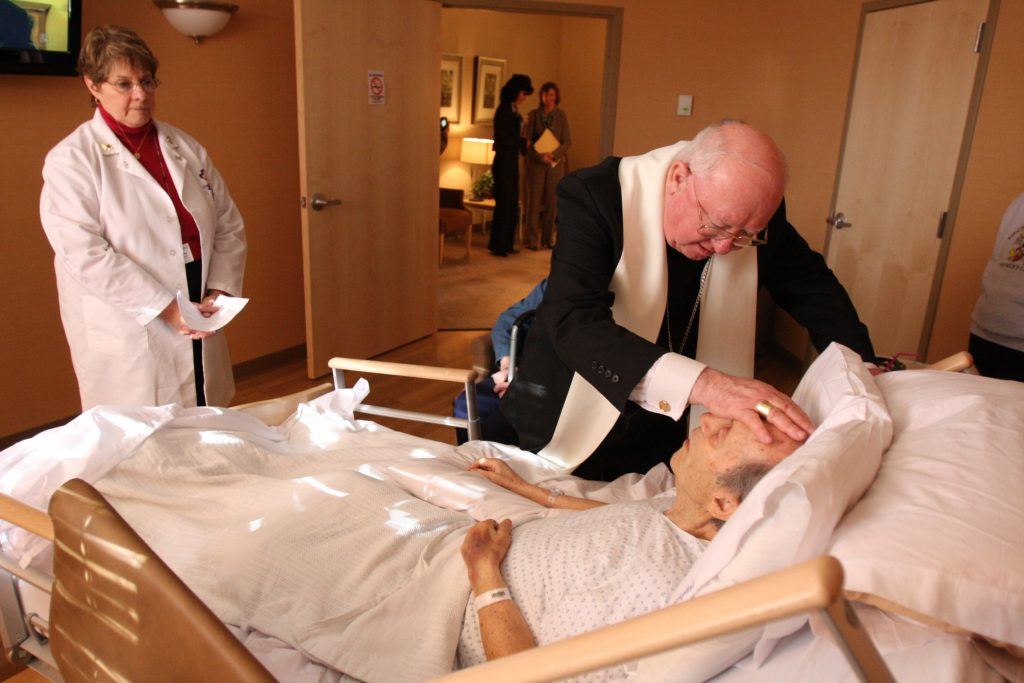THE PASCHAL MYSTERY AND THE ANOINTING OF THE SICK
THE PASCHAL
MYSTERY AND THE ANOINTING OF THE SICK
A good part
of Jesus’ public ministry involved miracles of healing. These healings served as signs of the coming
of the Kingdom of God. They also convinced
some that his teachings could be trusted. An attentive scholar of the prophets who
witnessed his miracles might reasonably have wondered if they were fulfillments
of prophecy, such as in Isaiah 35: “Then the eyes of the blind shall see, and
the ears of the deaf be opened. Then the
lame shall leap like a stag, and the mute tongue sing for joy,” or Isaiah 53: “Surely
he has born our infirmities and carried our diseases.” Jesus himself pointed to his healing miracles
as proof of his messiahship when the disciples of John the Baptist asked him if
he were “the one who is to come” (cf. Mat 11:2-6).
The healings which Jesus performed revealed his
compassion for both the temporal and spiritual needs of the human person. They also anticipated his ultimate victory
over all suffering and death, which he would win by his Paschal Mystery. The Catechism teaches that “They announced a
more radical healing: the victory over sin and death through his Passover. On the Cross Christ took upon himself the
whole weight of evil and took away the ‘sin of the world’ of which illness is
only a consequence” (#1505; cf. Jn 2:29).
In the Old Testament illness is sometimes viewed as the result of
personal sin, even though, as in the case of the parable of Job, it also
recognized that illness and bad fortune are not always merited. While some people become sick because of
their sinful lifestyle or culpable neglect of their health, most people become
sick as the result of a pathology or disease for which they have no personal responsibility.
The sad
fact is that apart from a tragic injury everyone will eventually get sick and
die. There are no exceptions. Since this is a universal experience, Jesus
in his mercy gave us a sacrament to help us when we are in extremes. This sacrament is called the Sacrament of the
Sick, or the Anointing of the Sick, or Extreme Unction (i.e., Last Rites) if
the individual is actively dying. The
grace of the sacrament unites the sick to the Passion of Christ; it strengthens
them so that they may offer their sufferings to the Lord in reparation for their
sins or those of others; it prepares them to pass from this world to eternal
life; and it forgives mortal sins without confession in the case where the individual
is physically unable to confess. If it
is God’s will, the grace of the sacrament will restore one’s health, which I
have witnessed on several occasions.
Since it
involves the forgiveness of sins through the ministry of the Church, the Sacrament
of the Sick can only be celebrated by a priest or bishop, who while saying the
proper formula anoints the sick person with holy oil and lays his hand on him
or her. It is important to keep in mind
that every sacrament must be celebrated in person; it cannot be celebrated over
the phone, or by zoom, or with the priest standing outside the room of the
patient. All the sacraments require
human proximity, and all require touch except for Penance. Moreover, the sacraments are for the living
and cannot help a person who has died, which is why it is not a good idea to
wait until the last moment to call the priest.
Some of the
prayers for the Rite of the Sacrament of the Sick directly evoke the Paschal
Mystery, which of course refers to the Passion, death, and Resurrection of
Christ. For example, after the patient
receives Communion the priest says, “All-powerful God, through the Paschal
Mystery of Christ your Son you have completed the work of our redemption. May we, who in these sacramental signs
proclaim his death and Resurrection, grow in the experience of your saving
power.” Another example, said for someone
who is dying: “May Christ who was crucified for you bring you freedom and
peace. May Christ who died for you admit
you into his garden of Paradise.” The Sacrament
of the Sick is a healing sacrament, an important help to salvation, and a great
comfort to the sick and dying. Christ
and the Church are present in the person of the priest and those who are
gathered at the side of the person who is sick or dying. All this was made possible by the Paschal
Mystery of our adorable Savior.




Comments
Post a Comment